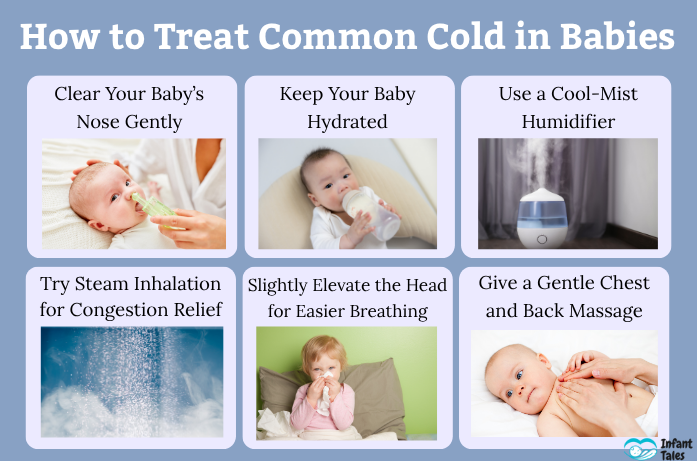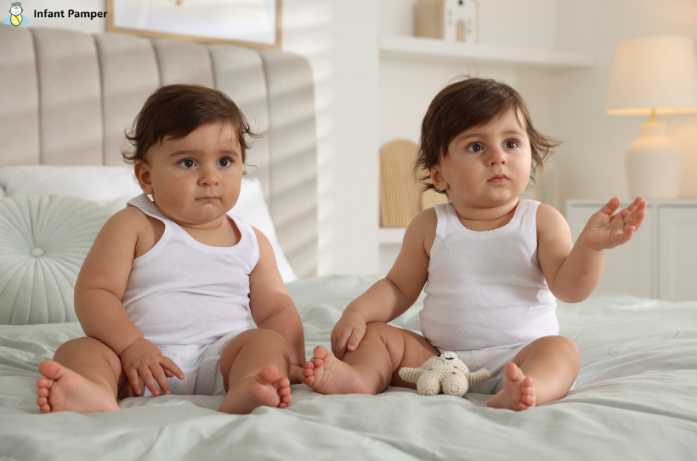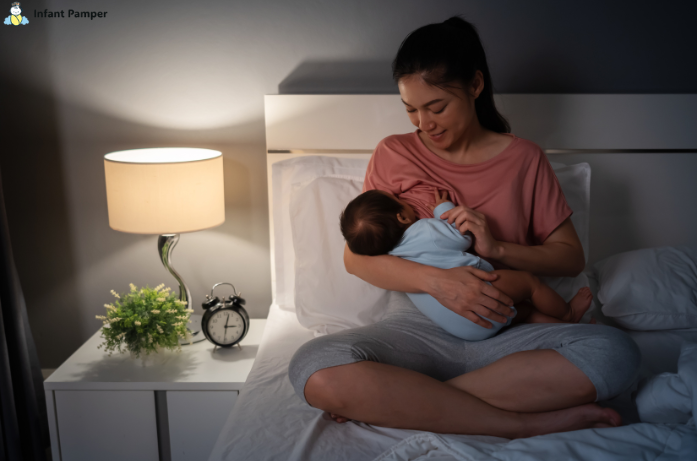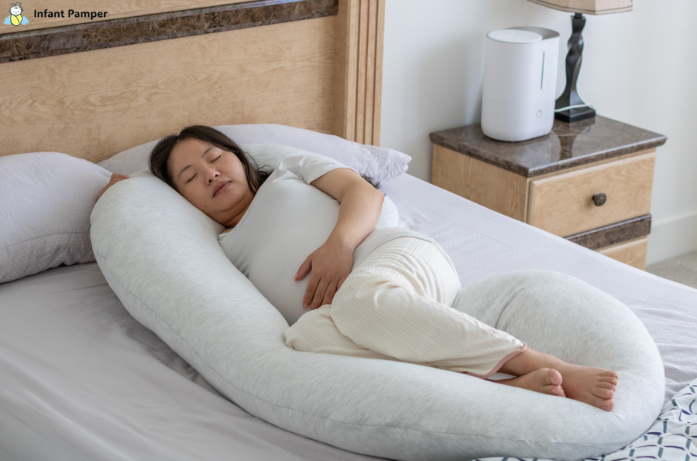By a Caring Mom at Infant Pamper
It’s always hard to see your baby under the weather, especially when they’re sneezing, coughing, and have a runny nose. The common cold in baby is exactly what it sounds like common. In fact, it’s one of the most frequent illnesses a baby will face during their first year of life.
While a cold is usually mild and clears up on its own, it can still be tough on babies and worrying for parents. This guide will walk you through everything you need to know: what causes a baby cold symptoms to look out for, how to care for your baby, and when it’s time to call a doctor.
What Is the Common Cold in Baby?
A cold is a viral disease that infects the upper respiratory system, and that comprises the nose, throat, and sinuses. It causes irritation in the lining of the nose and increases the secretion of mucus thus causing a runny or blocked nose, sneezing, and coughing. According to the Mayo Clinic, these symptoms are typical of viral infections in infants and usually resolve with home care.
Most babies get their first cold within a few months of birth. Moreover, since their immune system is still maturing, they might get 6 to 10 colds per year. This scenario is considered normal, especially if the children are in daycare or have older siblings.
How Do Babies Catch a Cold?
Colds are caused by viruses not bacteria which means antibiotics will not be effective. There are more than 200 viruses that may cause a cold, however, rhinovirus is the most common one. (Cleveland Clinic).
The babies will get the cold viruses in the following ways:
- Inhaling virus-infected droplets released by a nearby person who sneezed or coughed
- Touching the mouth, nose, or eyes after playing with toys or surfaces that are contaminated with the virus
- Being in close contact with the sick children or adults
The highest incidence of colds is during autumn and winter seasons but they can occur throughout the year.

Symptoms of Common Cold in Babies
Symptoms of a Cold in Babies
- Runny nose (clear or yellowish mucus)
- Sneezing
- Mild fever (usually under 101°F or 38.3°C)
- Coughing
- Fussiness or irritability
- Reduced appetite
- Watery eyes
- Difficulty sleeping or feeding
- Mild body aches or tiredness
These symptoms can start off mild and gradually get worse by day 2 or 3. The good news is that most colds in babies are not serious and resolve within a week to ten days.
How Long Does a Baby Cold Last?
Generally, a cold will take around 7 to 10 days to clear out completely of its symptoms, but some symptoms like coughing may linger up to 2 weeks, especially in younger babies.
Normal baby cold timeline:
- Days 1–3: Sneezing, runny nose, mild coughing begin
- Days 4–6: Sneezing, runny nose, mild coughing begin
- Days 7–10: Improved symptoms slowly

How to Treat Common Cold in Babies
Common cold cannot be cured but it is possible to alleviate symptoms and make the child comfortable. Below are some of the safe and gentle home treatments which you can try:
1. Clear Their Nose
Saline + nasal drops can really help to break up the mucus formation in the nose. After putting 1-2 drops in each nostril, just gently suck out the mucus with the help of a bulb syringe or a nasal aspirator. It is particularly helpful when done before feeding or bedtime.
2. Keep Them Hydrated
When babies are sick, they can get dehydratd quite easily. Hence, always ensure that your baby is taking in sufficient amount of breast milk or formula. For babies aged six months and older, you may also offer a little bit of water in sips.
3. Use a Cool-Mist Humidifier
Keeping the air dry can worsen the stuffiness. Placing a cool-mist humidifier in your baby’s chamber will not only add moisture to the air but also ease the reception of mucus. Make sure to clean the humidifier daily so that mold and bacteria do not accumulate.
4. Try Steam Inhalation
For 10 to 15 minutes, you can be in a bathroom with steam and your baby. The warmth of the steam may clear the plugged nose and soothe the coughing.
5. Elevate the Head Slightly
If your child is over 12 months old, then elevating the head part of the mattress slightly (not with a pillow under the child!) will surely help in the drainage and breathing process.
6. Gentle Chest Massage
Use your warm hands to gently rub your infant’s chest, back and feet. This may help soothe your baby and induce relaxation, particularly before going to sleep.
Avoid: Cold medicines that are available over-the-counter. They are not suitable for babies below 4 years unless specifically allowed by your pediatrician. Narayana Health emphasizes supportive care rather than medication for colds in babies.
When should I see a healthcare provider for the common cold?
In some instances, the common cold in a baby might result in complications such as ear infection, bronchiolitis, or even pneumonia. Therefore, it is very crucial to be aware of the signs indicating that the baby needs a doctor’s intervention.
Call your doctor if:
- Baby is under 3 months and has a fever of 100.4°F (38°C) or higher
- Your baby is having difficulty breathing (breathing fast, shallow, or making noise)
- Baby’s lips or fingernails become blue or gray
- Baby is eating poorly or has less wet diapers (less than 4 in 24 hours)
- Symptoms last more than 10 days
- Cough becomes stronger or leads to wheezing
- Your baby is very drowsy, difficult to arouse, or unusually cranky
How to Keep Your Baby from Getting a Cold
Prevention is always preferable to cure. Although you can’t completely protect your baby from germs, you can minimize their chances of falling sick:
- Wash hands frequently, especially before feeding or holding the baby
- Request that sick visitors refrain from getting close to the baby
- Clean children’s toys, pacifiers, and common surfaces regularly
- Avoid taking babies to crowded places during the winter season when colds and flu are rampant
- If possible, breastfeed your little one to strengthen his/her immune response
- Ensure that all caregivers and family members have received their vaccinations
Despite taking all these precautions, colds may still occur, and there is nothing wrong with that. It is simply a part of the process of your baby developing immunity.
Is it Possible for a Baby’s Cold to Turn into a Serious Condition?
Sure, a cold can lead to complications, in very young babies or those with health problems, these complications may be more frequent. Signs to look for include high fever, chest congestion, or difficulty in breathing. These could indicate: Bronchiolitis, Ear infection, Sinus infection, Croup, Pneumonia
Whenever you have any doubts, do not hesitate to contact your baby’s pediatrician. You are the best judge, your baby is the one you know most.
Final Thought
It may be hard to watch your baby going through the experience of their first cold, but do not get discouraged. Generally, colds in babies are not serious and they will eventually recover completely with little time, comfort, and care.
Parental love and care are the best medicine for the little ones. In addition, keep the baby well hydrated, have a clean nose, give a lot of hugs, and monitor them very carefully for any signs needing a doctor’s intervention. You are doing a great job even when the situation feels messy and uncertain.
Quick FAQs About Baby Colds
1. How long does a cold last in babies?
A baby cold usually lasts 7 to 10 days, during which a runny nose and a mild cough are the most common symptoms that gradually disappear.
2. Can I give my baby medicine for a cold?
Cold medications are not safe for infants under 4 years, so the use of saline drops and a humidifier is recommended instead of medications.
3. When should I call the doctor for a baby cold?
If your baby has a high fever, breathing difficulties, refuses to feed, or shows cold symptoms for more than 10 days, do call your pediatrician.
4. Is sneezing a sign of a cold in babies?
It is true that sneezing is a common symptom of a baby cold, and at the same time, it serves the purpose of clearing the nasal passages.
5. How can I prevent my baby from catching colds?
Frequent hand washing, keeping sick people away, regular cleaning of toys, and breastfeeding, if possible, are all ways to prevent a baby from catching colds.
Become part of the Infant Pamper community, and we will deliver trusted tips, kind guidance, and real parental experiences right to your inbox. We are always here to support you, from newborn care to toddler milestones, one cuddle at a time.
Medical Disclaimer: This article is for informative purposes only. It is not equivalent to professional medical advice, diagnosis, or treatment. Always consult your pediatrician or healthcare provider for any concerns about your baby’s health.




